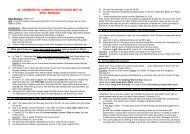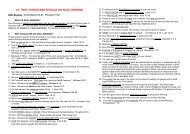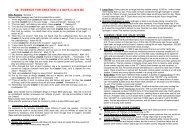117. JEHOVAH'S WITNESSES, the TRINITY and THE ... - Answers
117. JEHOVAH'S WITNESSES, the TRINITY and THE ... - Answers
117. JEHOVAH'S WITNESSES, the TRINITY and THE ... - Answers
Create successful ePaper yourself
Turn your PDF publications into a flip-book with our unique Google optimized e-Paper software.
That is, when two nouns in <strong>the</strong> nominative case are linked by <strong>the</strong> verb ‘to be’ (am, is, are,<br />
was, were, be, being or been), it may not be clear which is <strong>the</strong> subject <strong>and</strong> which is <strong>the</strong><br />
predicate. Thus, ‘ • •’ could be ei<strong>the</strong>r ‘<strong>the</strong> Word was God’ or<br />
‘God was <strong>the</strong> Word’. However, for <strong>the</strong> Greek syntax, <strong>the</strong> predicate () drops <strong>the</strong><br />
definite article (‘’) <strong>and</strong> is placed before <strong>the</strong> verb. Therefore, ‘ • <br />
•’ can only be ‘The Word was God’, as in <strong>the</strong> KJV. (see The elements of New<br />
Testament Greek, J.W. Wenham, p.35)<br />
Notice that since this clause uses a linking verb, both <strong>the</strong> subject <strong>and</strong> <strong>the</strong> predicate are in <strong>the</strong><br />
nominative case (ie. ‘’ ending on <strong>the</strong> nouns - ‘•’ <strong>and</strong> ‘’), so case<br />
endings do not identify <strong>the</strong> subject. Instead, <strong>the</strong> definite article ‘<strong>the</strong>’ points out <strong>the</strong> subject of<br />
<strong>the</strong> clause. Greek uses <strong>the</strong> definite article ‘<strong>the</strong>’ to accomplish what <strong>the</strong> English language does<br />
by word order (subject first, verb next, <strong>the</strong>n <strong>the</strong> object in a sentence). Hence, of <strong>the</strong> three<br />
ways that John could have written John 1:1, only one is correct.<br />
i) • • FALSE (Not used by John)<br />
can mean ei<strong>the</strong>r ‘God was <strong>the</strong> Word’ or ‘<strong>the</strong> Word was God’. Both <strong>the</strong> subject <strong>and</strong> <strong>the</strong><br />
predicate having <strong>the</strong> article would have taught Sabellianism, so John didn’t write it this way;<br />
ii) • • FALSE (Not used by John)<br />
can mean only ‘God was <strong>the</strong> Word’. This would have clearly taught Sabellianism , so John<br />
didn’t write it this way ei<strong>the</strong>r;<br />
iii) • • CORRECT (As used by John)<br />
can mean only ‘The Word was God’.<br />
Conclusion. Translations which render <strong>the</strong> Greek in this verse as ‘a god’ or ‘divine’ are<br />
motivated by <strong>the</strong>ological, not grammatical considerations. The phrase ‘a god’ is particularly<br />
objectionable because it makes Christ a lesser god, which is poly<strong>the</strong>ism <strong>and</strong> contrary to<br />
Deuteronomy 32:39. If Christ is ‘a god’, <strong>the</strong>n He must be ei<strong>the</strong>r a ‘true God’ or a ‘false god’.<br />
If a ‘true God’, <strong>the</strong>n we have poly<strong>the</strong>ism. If a ‘false god’, <strong>the</strong>n He is unworthy of our belief.<br />
Of course, <strong>the</strong> correct translation found in <strong>the</strong> KJV <strong>and</strong> most o<strong>the</strong>r translations (‘<strong>the</strong> word<br />
was God’), presents Christ as <strong>the</strong> one <strong>and</strong> only true God, Jehovah. Therefore, He is<br />
mono<strong>the</strong>istic <strong>and</strong> worthy of our belief. John’s high view of Christ as God begins with John<br />
1:1 <strong>and</strong> ends his gospel with Thomas addressing Christ as ‘my Lord <strong>and</strong> my God’ in John<br />
20:28. These <strong>and</strong> o<strong>the</strong>r verses assert <strong>the</strong> full deity of Christ.<br />
PROVE TO BE WHAT I SHALL PROVE<br />
TO BE.’ And he added: ‘This is what you are<br />
to say to <strong>the</strong> sons of Israel, “I SHALL<br />
PROVE TO BE has sent me unto you!”’<br />
THAT I AM: <strong>and</strong> he said, Thus shalt<br />
thou say unto <strong>the</strong> children of Israel, ‘I<br />
AM hath sent me unto you.’<br />
The effect is that <strong>the</strong> NWT completely hides <strong>the</strong> connection between Christ in John 8:58 <strong>and</strong><br />
Jehovah God in Exodus 3:14. The Watchtower aims to keep Jesus from being identified as<br />
God Almighty.<br />
Bible Teaching: Does <strong>the</strong> evidence point to Jesus calling Himself ‘I AM’ <strong>and</strong> hence<br />
claiming to be God, or to ‘I have been’?<br />
1) Notice in John 8:58 that Jesus calls Himself ‘ego eimi’ in Greek.<br />
‘Ego eimi’ occurs 134 times in <strong>the</strong> Greek New Testament.<br />
Ask: Why is it that <strong>the</strong> New World Translation correctly translates ‘ego eimi’ 133 times as ‘I<br />
am’, except in John 8:58 where a major doctrine of <strong>the</strong> deity of Christ is at stake, where <strong>the</strong>y<br />
go against all <strong>the</strong>ir o<strong>the</strong>r correct translations of ‘Ego eimi’ <strong>and</strong> translate it as ‘I have been’?<br />
Question: What does ‘I AM’ mean?<br />
Answer: Yahweh is <strong>the</strong> eternal self-existent Being, who has always existed. God is beyond<br />
<strong>the</strong> realm of time: ‘Holy, Holy, Holy, Lord God Almighty, which was, <strong>and</strong> is, <strong>and</strong> is to<br />
come.’ (Revelation 4:8b)<br />
‘I am’ in Exodus 3:14 <strong>and</strong> ‘Yahweh’ in 3:15 are both derivatives of <strong>the</strong> verb ‘to be’.<br />
2) Church writers before 325 AD, always quote John 8:58 as ‘I am’:<br />
a) Irenaeus (120-202 AD)<br />
Vol 1, p 478<br />
b) Origen (185-254 AD)<br />
Vol 4, p 643<br />
c) Novatian (210-280 AD)<br />
Treatise Concerning <strong>the</strong> Trinity,<br />
Vol 5, p 624.<br />
d) Thaumaturgus (205-265 AD)<br />
Vol 6, p 51<br />
10. John 8:58<br />
NWT<br />
‘Before Abraham came into existence, I have been.’<br />
KJV<br />
‘Before Abraham was, I am.’<br />
Watchtower Teaching: JWs agree that Jesus was pre-existent (‘I have been’), but will not<br />
agree that Jesus was eternally pre-existent (‘I am’). Jesus in John 8:58 claims to be <strong>the</strong> ‘I am’<br />
of Exodus 3:14 which clearly refers to Jehovah God. They also mistranslate Exodus 3:14:<br />
NWT<br />
KJV<br />
At this God said to Moses: ‘I SHALL And God said unto Moses, I AM<br />
3) The JW Kingdom Interlinear Translation (1985) reveals that John 8:58 has ‘ego<br />
eimi’ (Greek: ), translating it correctly as ‘I am’.This contradicts <strong>the</strong> NWT<br />
reading.<br />
4) Jesus claiming <strong>the</strong> title ‘I have been’ would not have caused <strong>the</strong> Jews to stone Him.<br />
(John 8:59). Hebrew law gave five cases where stoning was legal:<br />
i) Having a familiar spirit. (Leviticus 20:27)





